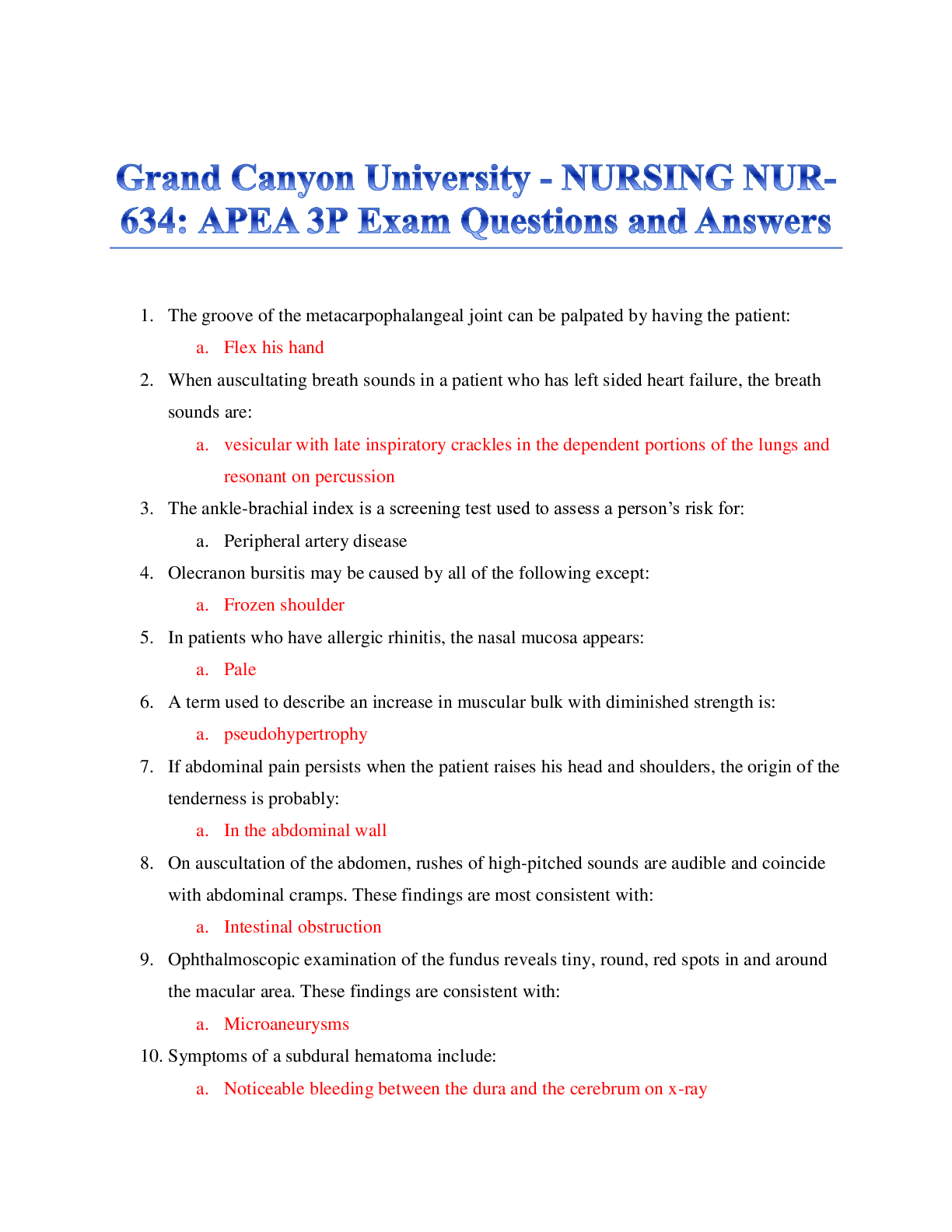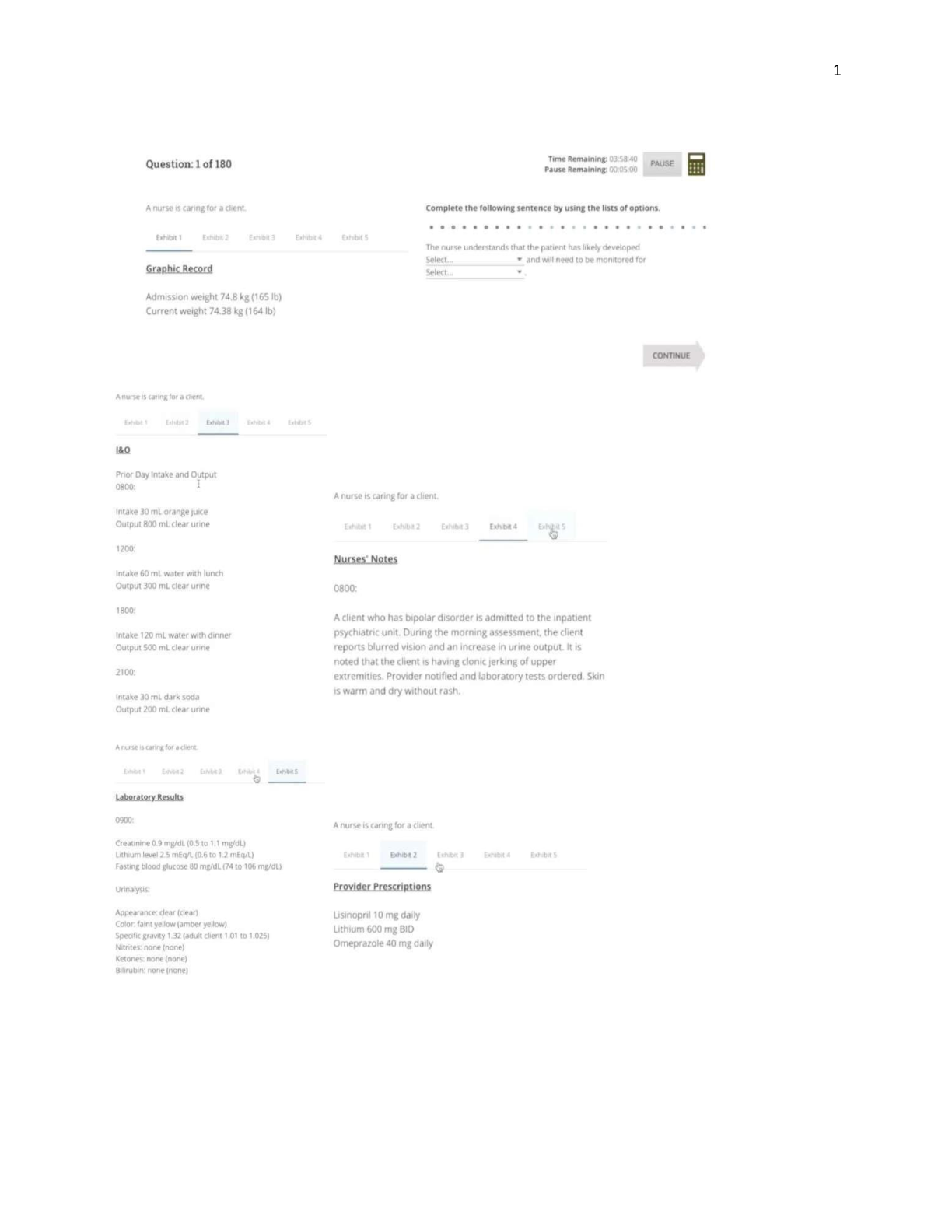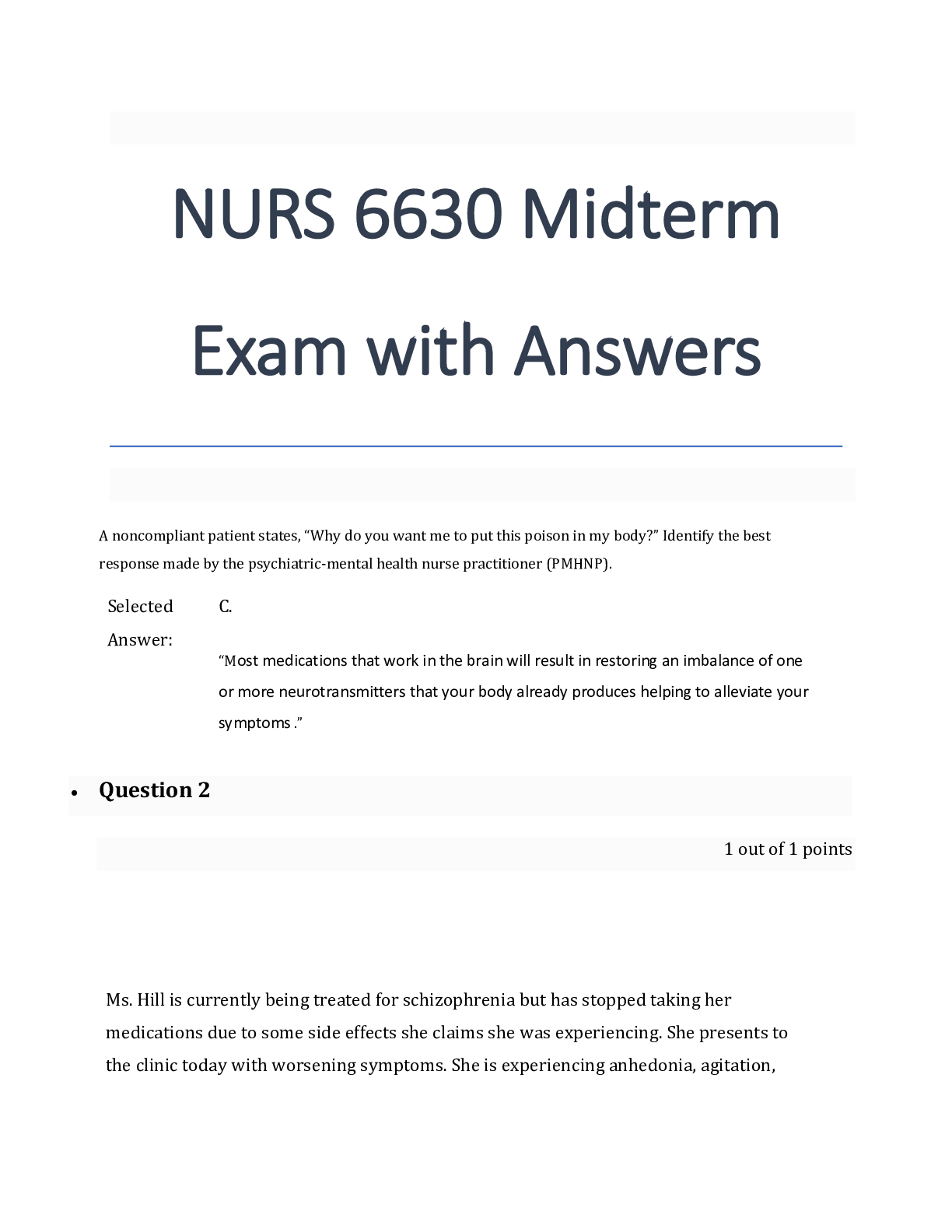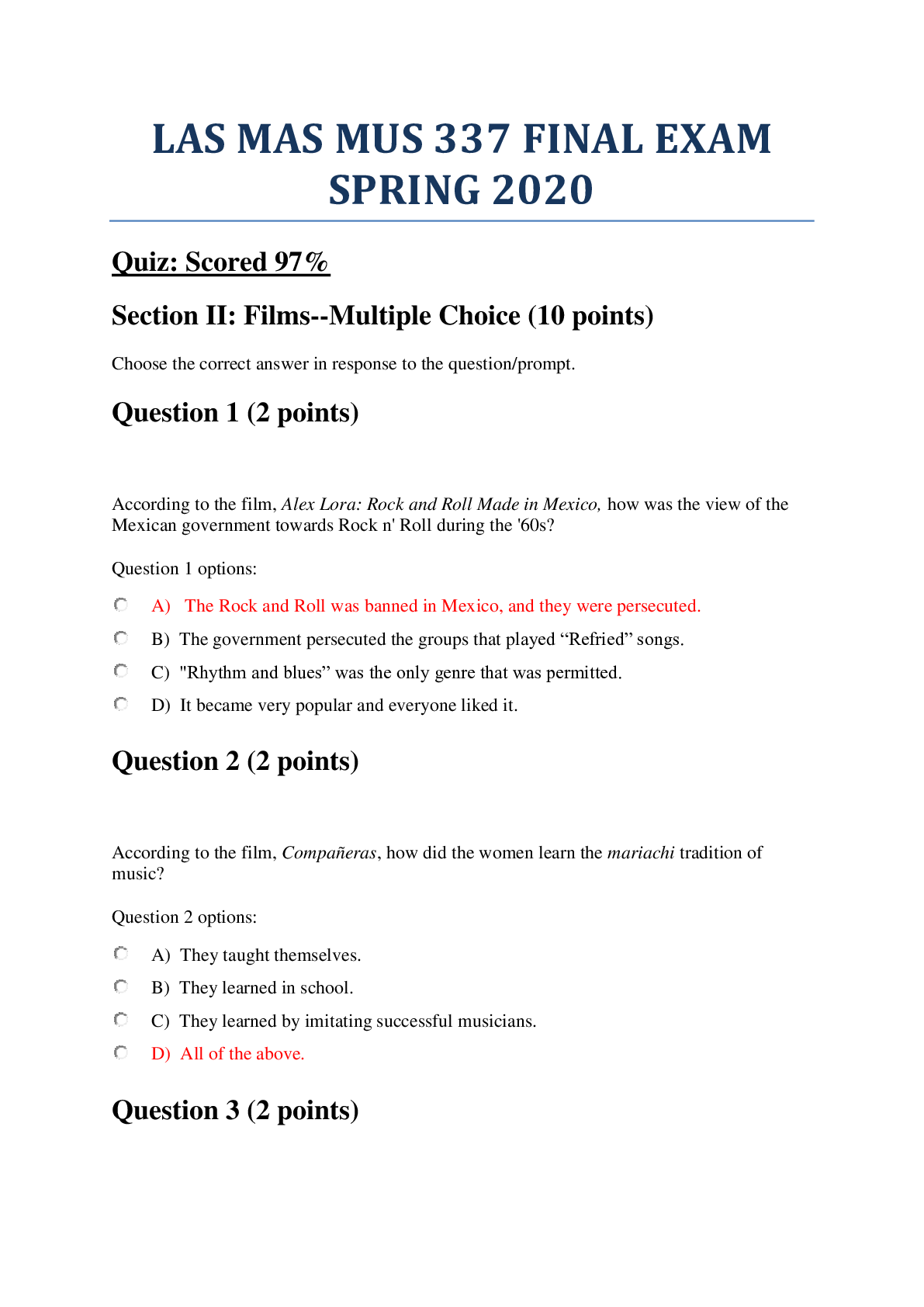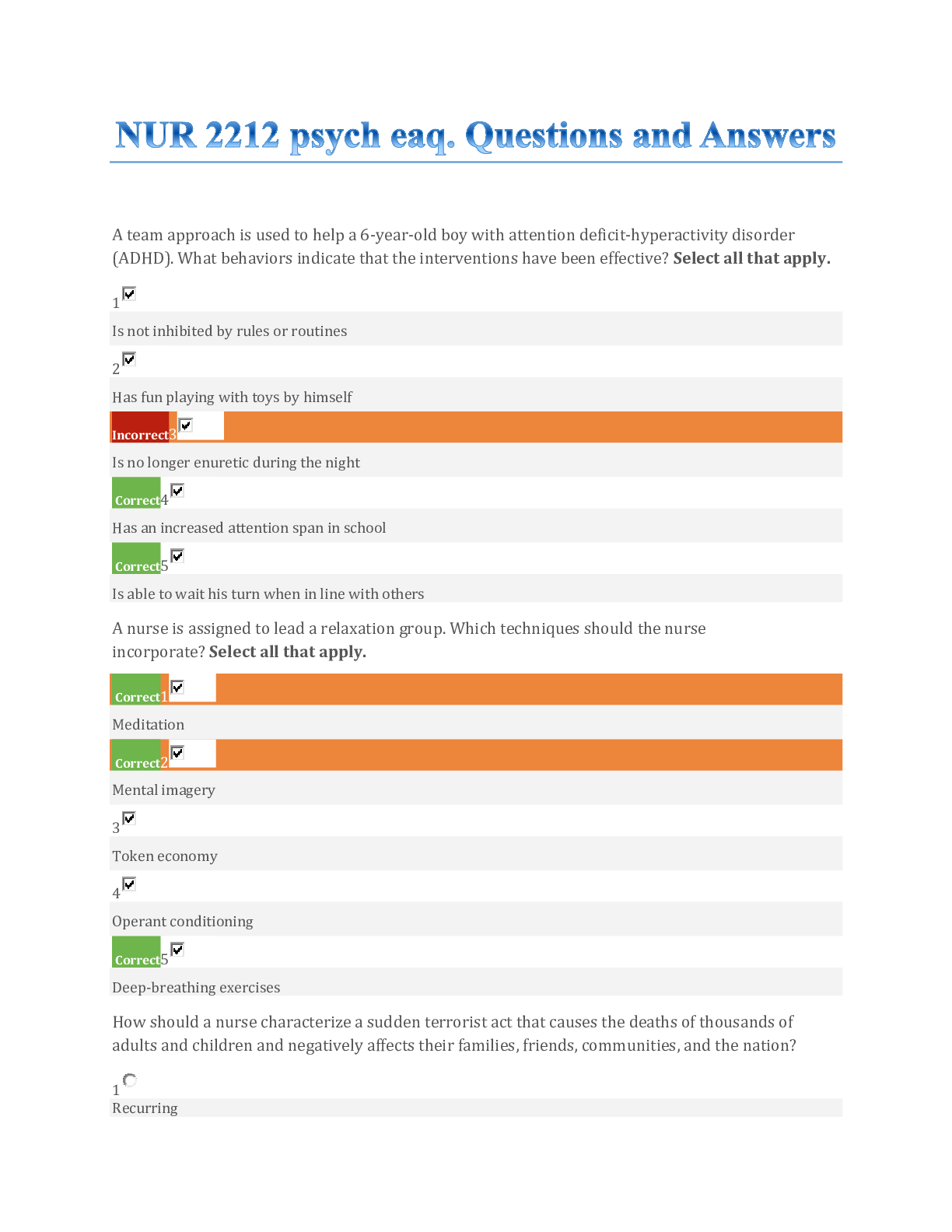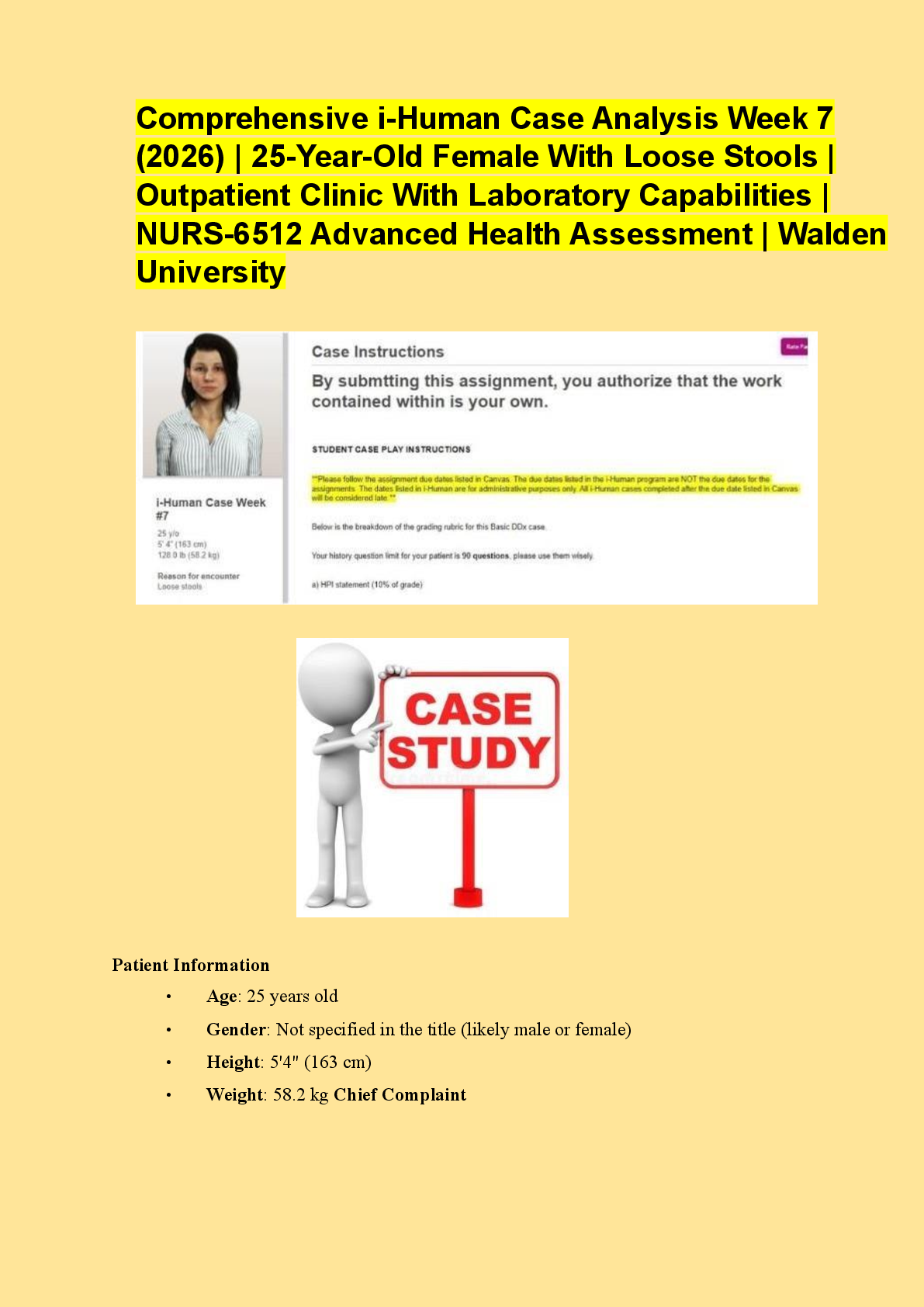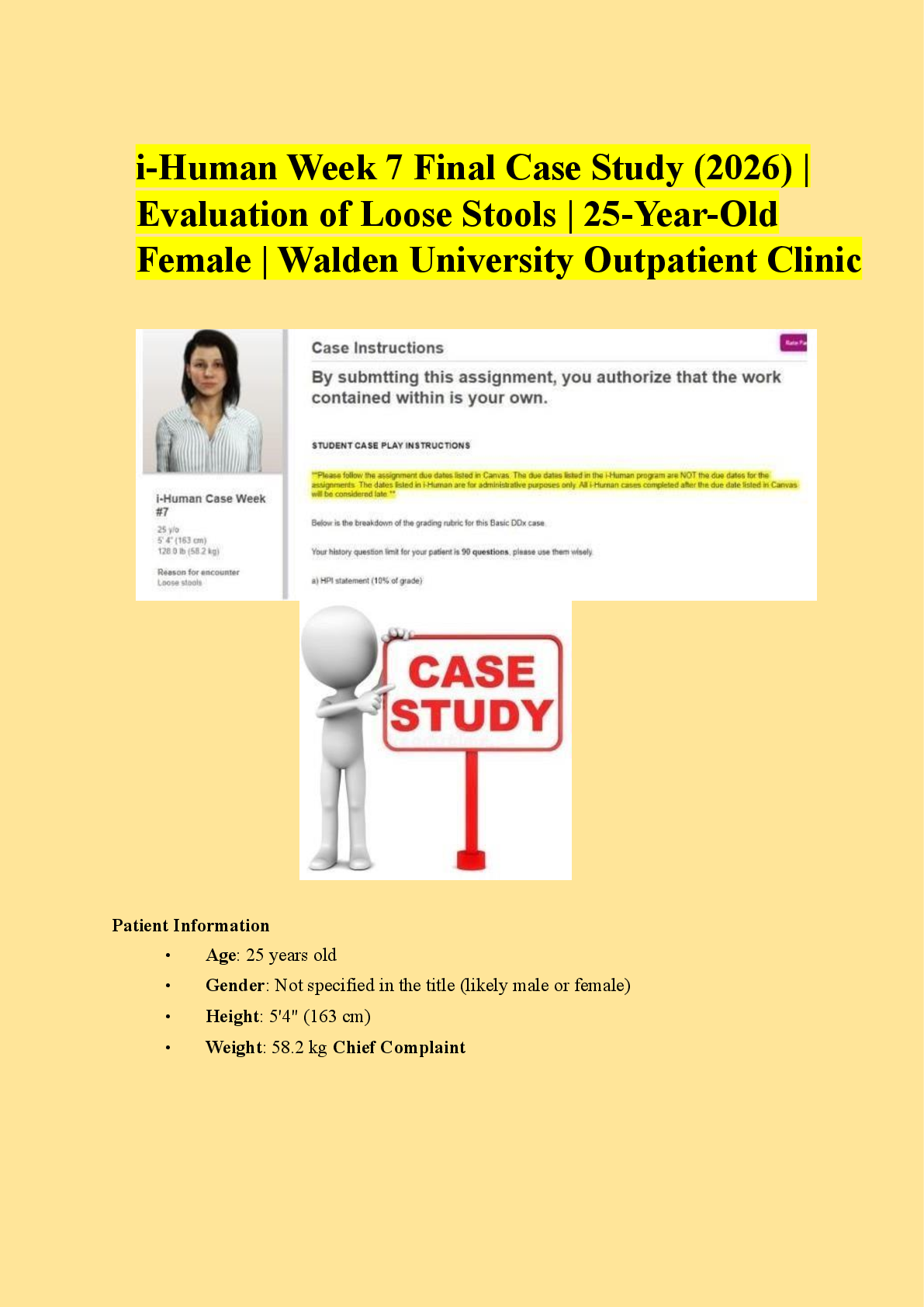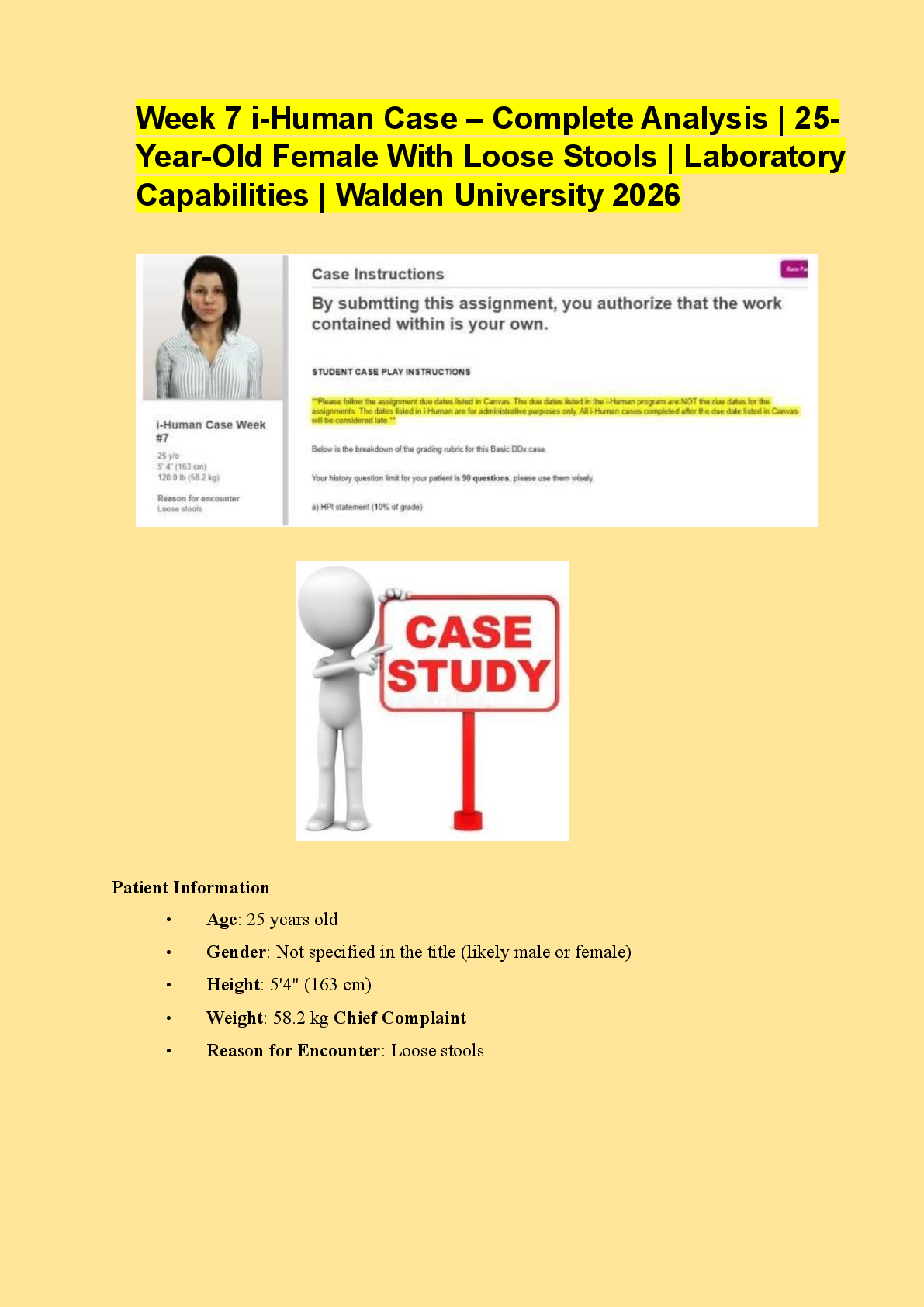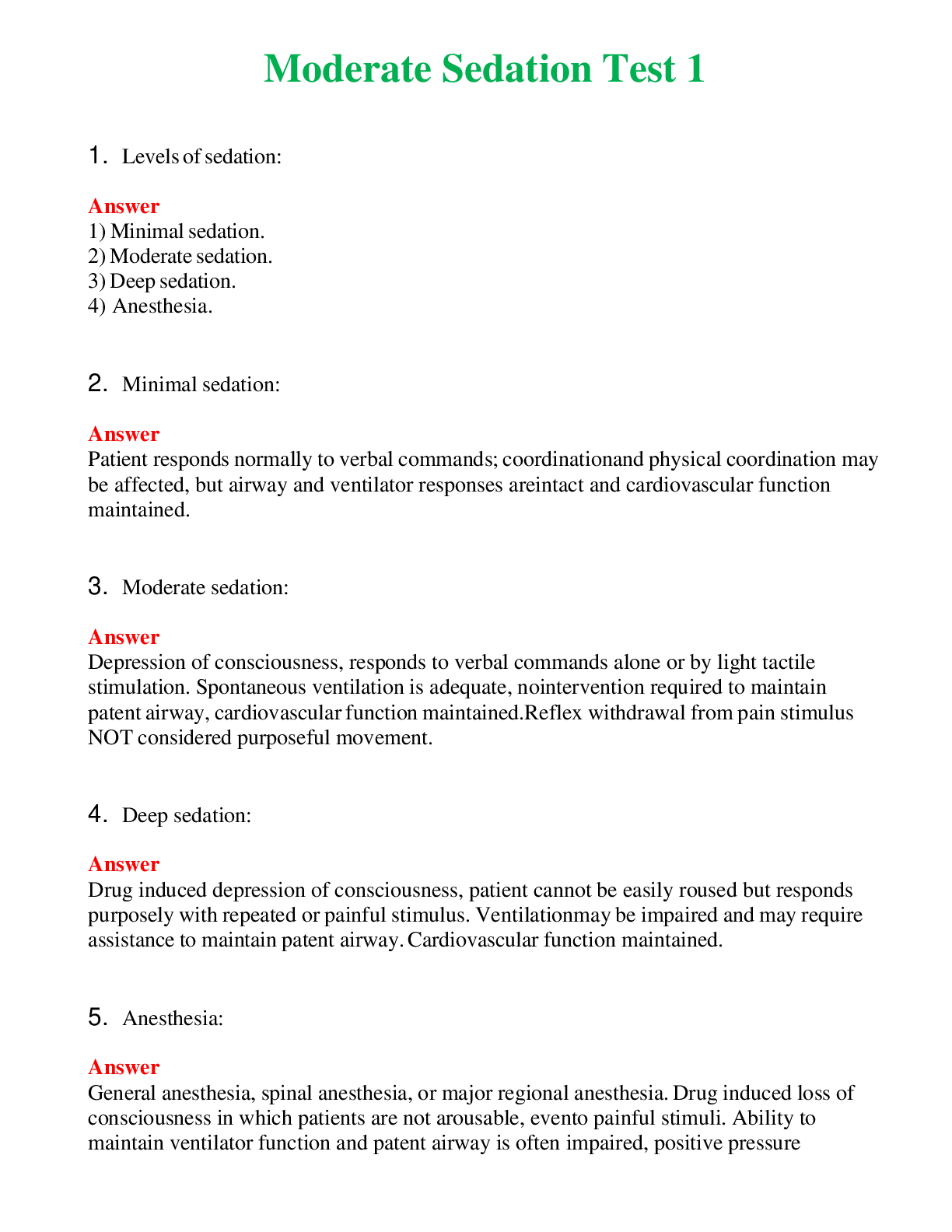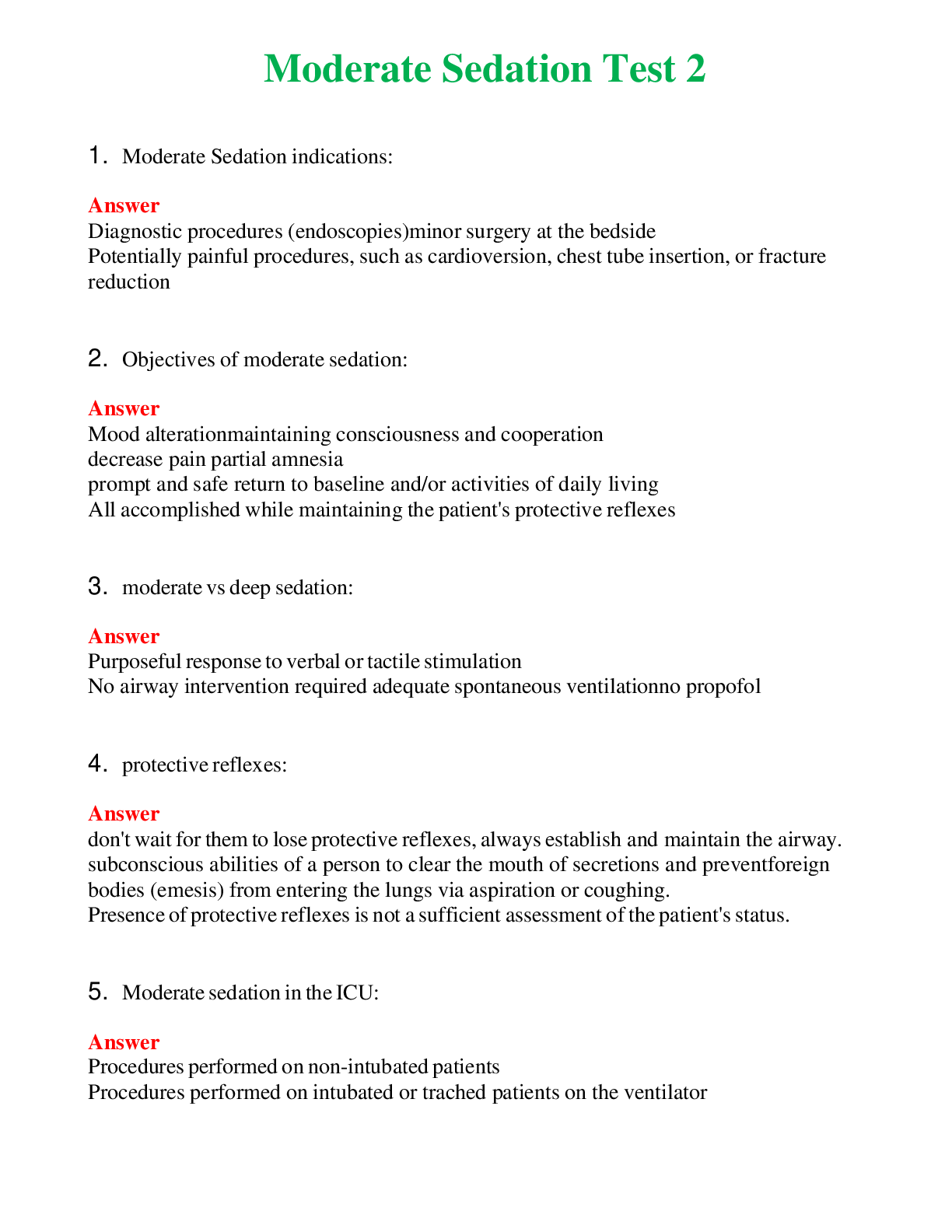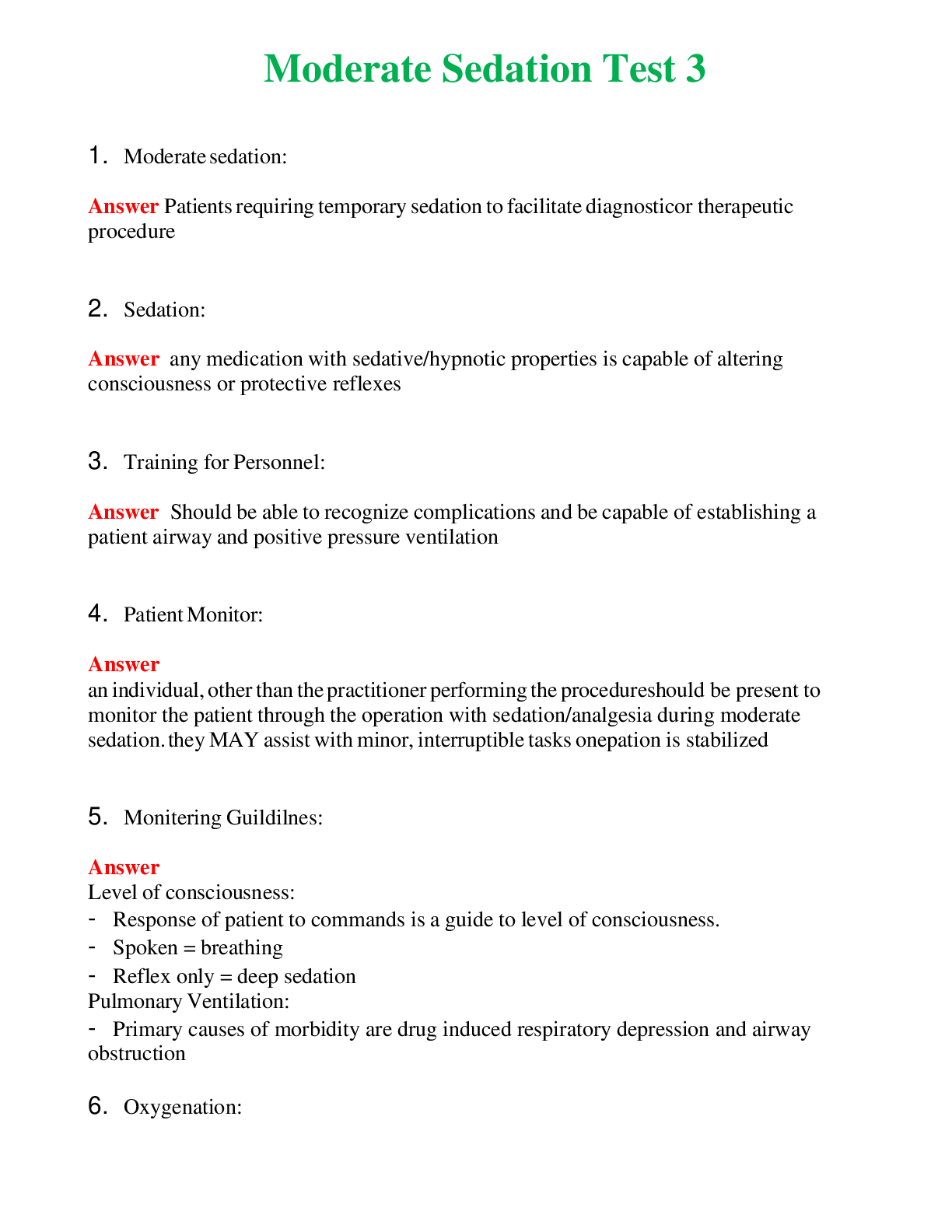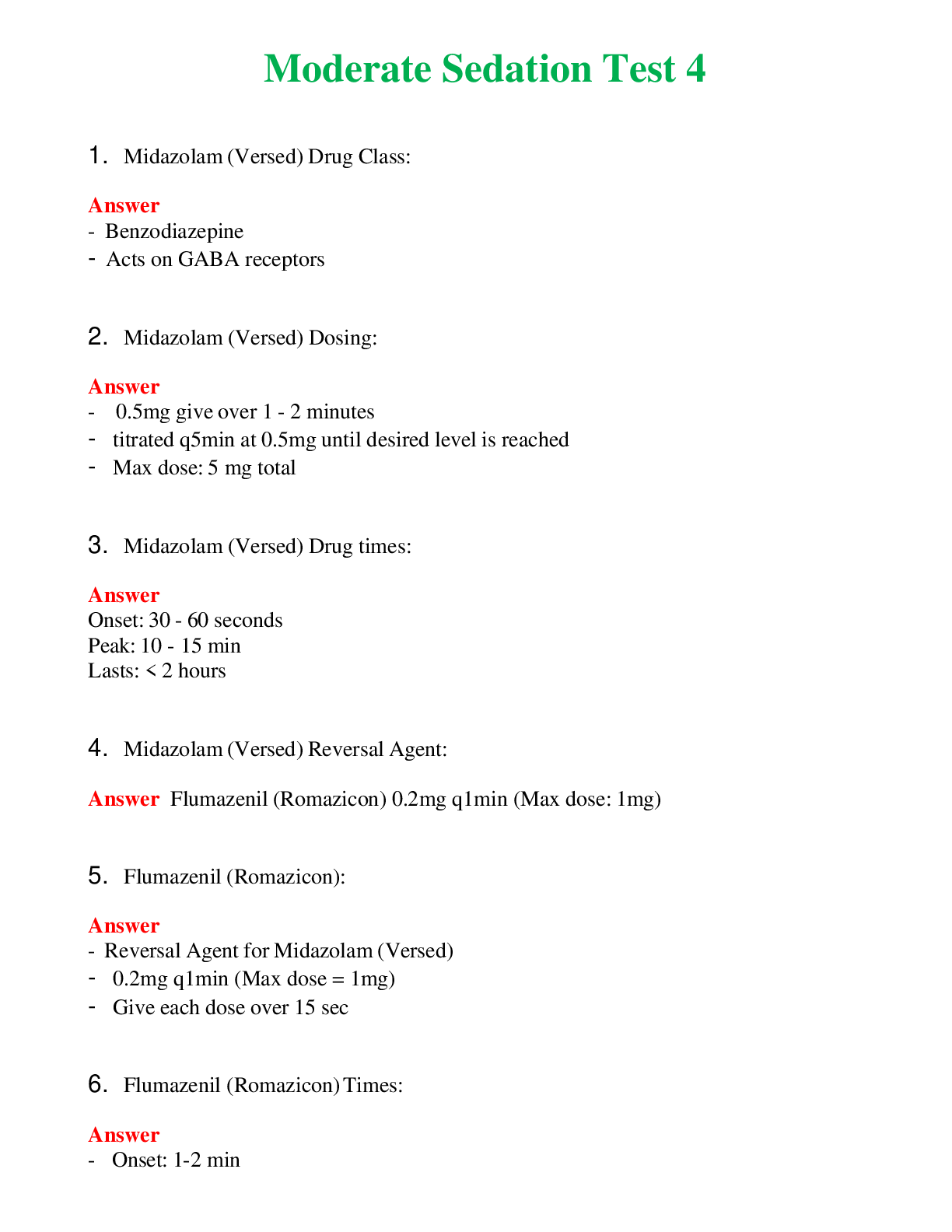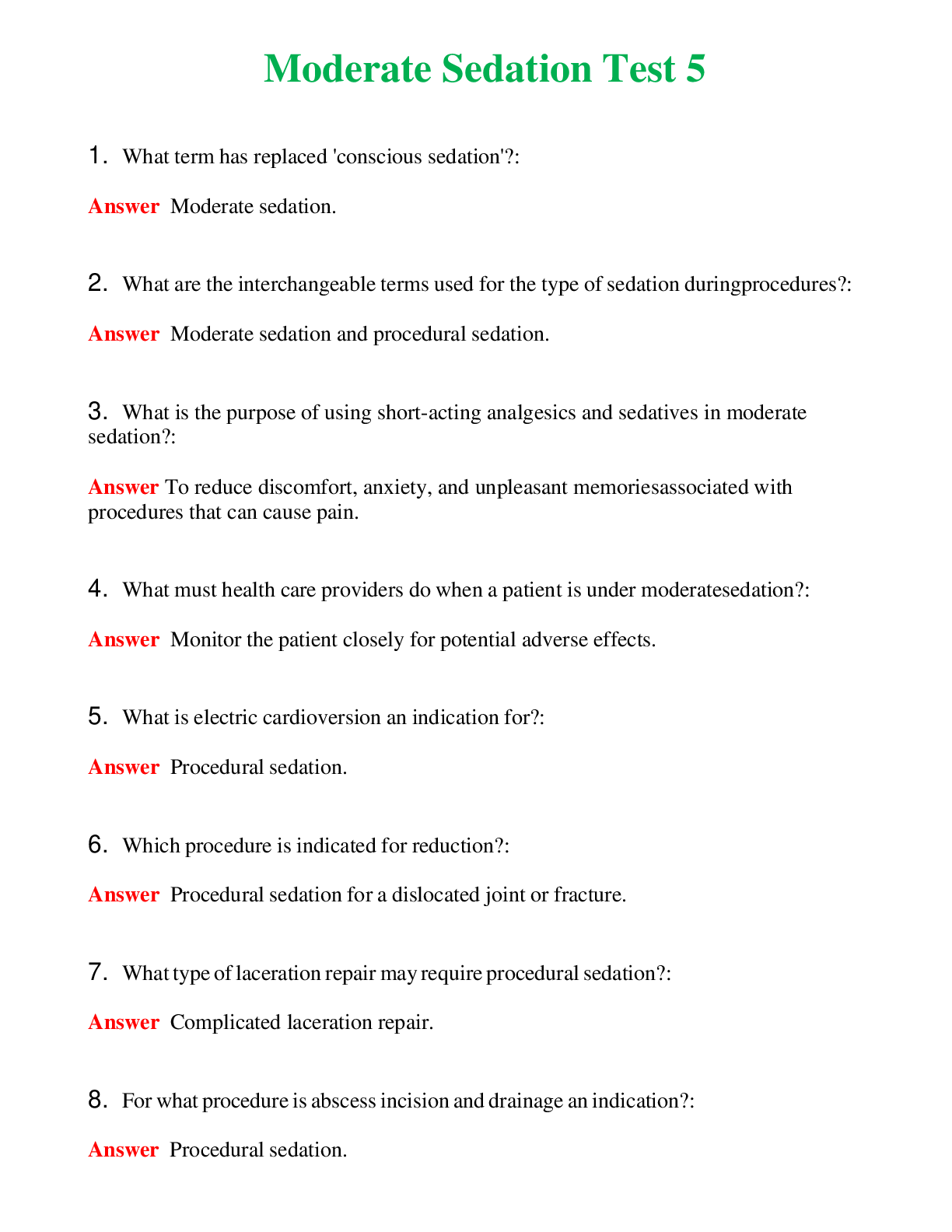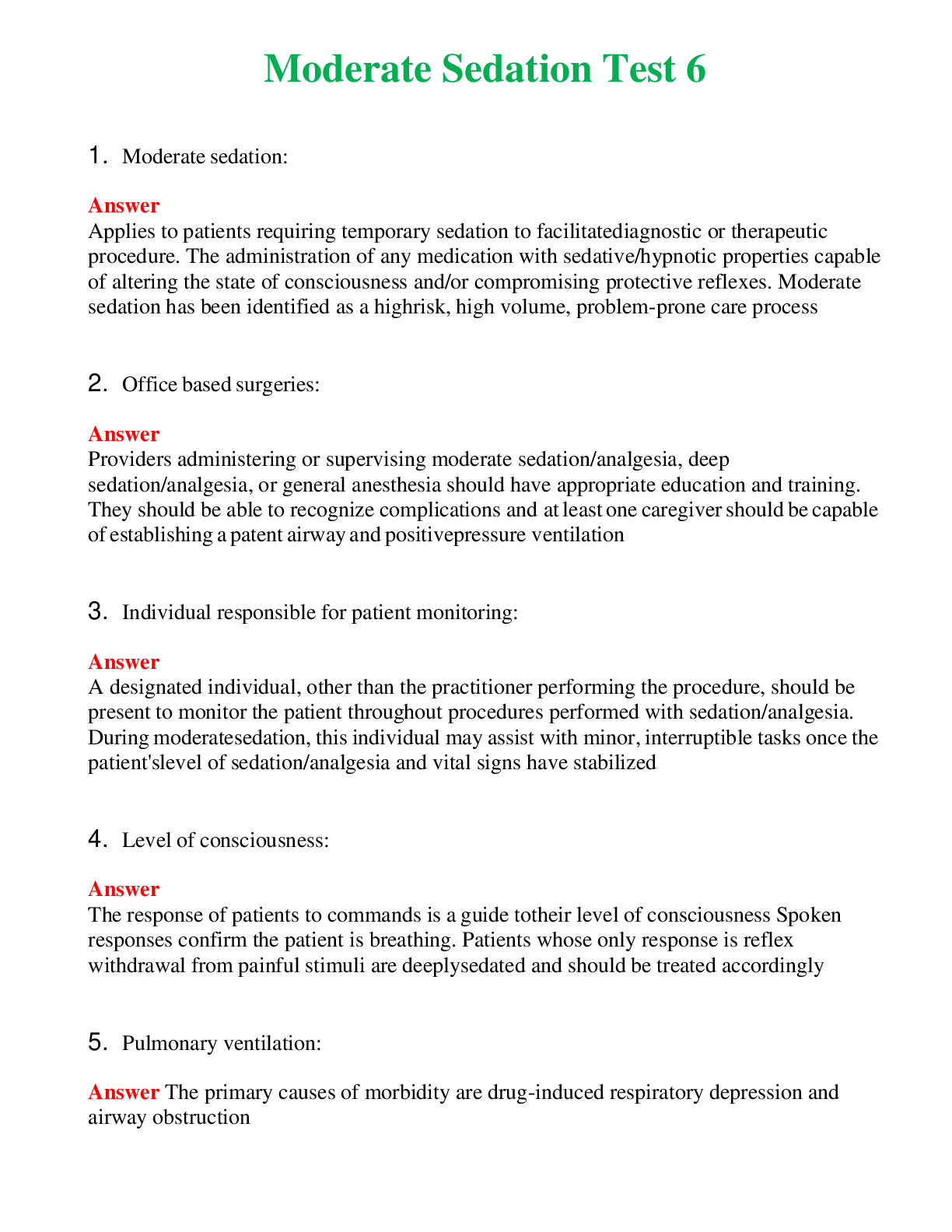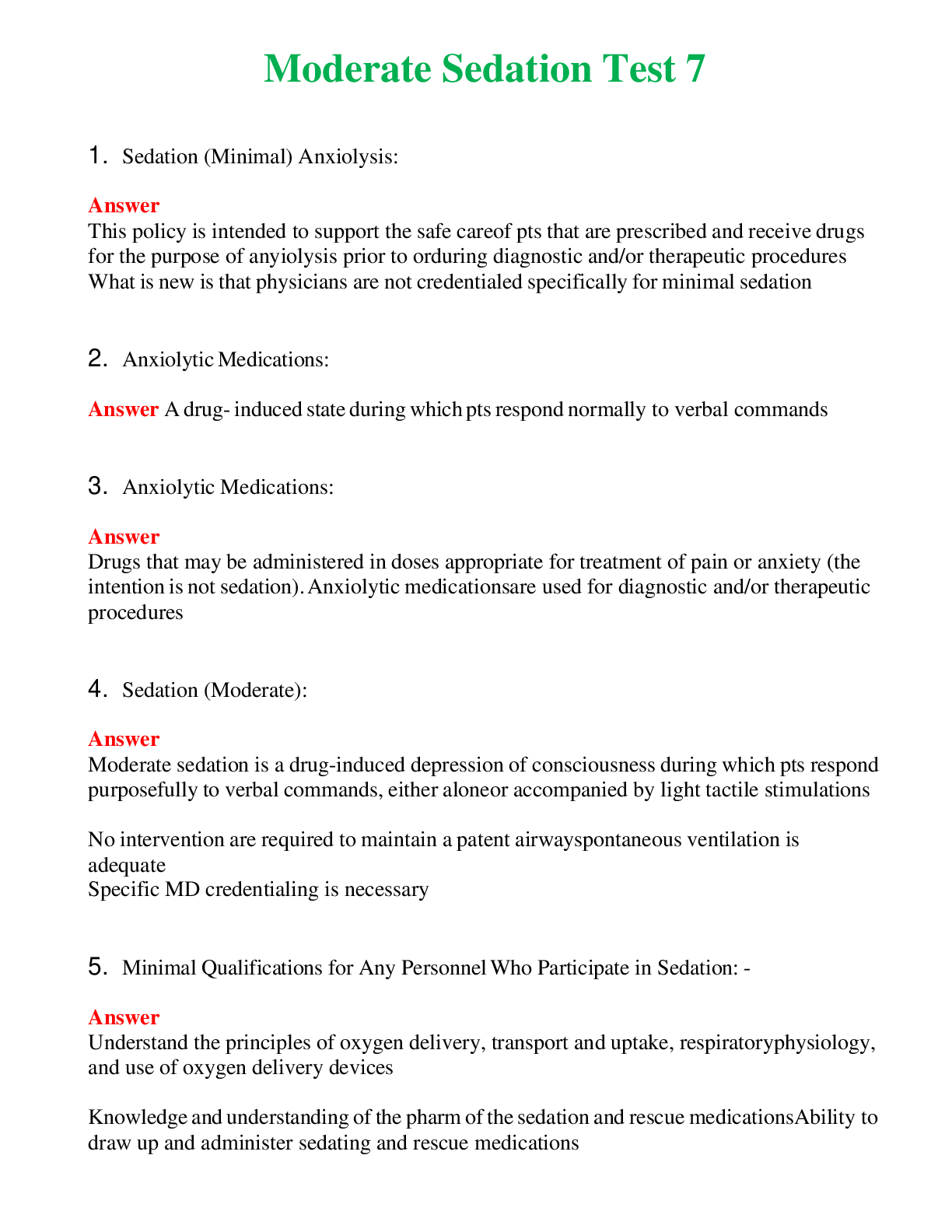Health Care > EXAM > HISTORY AP AMERICAAPUSH Module 1 Exam. Graded A. with 94% Pass Rate. (All)
HISTORY AP AMERICAAPUSH Module 1 Exam. Graded A. with 94% Pass Rate.
Document Content and Description Below
HISTORY AP AMERICAAPUSH Module 1 Exam 1. (01.02 MC) The most significant initial impact on the Native American population from interaction with Europeans came from (4 points) technology such ... as guns and horses, which allowed them to "civilize" rapidly old world diseases from which they had little to no immunity domesticated livestock, which created much greater food variety seeds and plants, which transformed the landscape of North America 4 of 4 2. (01.02 MC) What role did religion play in Cortés's and Columbus's explorations? (4 points) They were determined to convert American Indians to Christianity. Catholics in Spain and Italy supported their expeditions because they wanted to end Muslim control of the Eastern trade. They benefited from Ferdinand's and Isabella's efforts to promote tolerance in Spain. Spain wanted them to find a refuge for those being driven out of the country by the Reconquista. 4 of 4 3. (01.02 LC) Which one of the following is true of agriculture in Spanish America? (4 points) African American slaves performed most of the labor. Spain did not do any farming in its empire. American Indian slaves did the work on large-scale farms. Catholic priests were forbidden to be involved in farming. 4 of 4 4. (01.02 LC) Which of the following is true of the Spanish conquerors in the Americas? (4 points) At first, they thought the American Indians would be easy to convert to Christianity. They thought that the American Indians did not know the value of gold and silver. They were surprised by the poverty of most American Indians, even the leaders. At first, they thought the American Indians had a religion similar to their own. 0 of 4 5. (01.02 MC) What motivated the Portuguese to begin exploration to find a water route to India, China, and the East Indies? (4 points) To prove that the world was round To establish land empires in India and China To eliminate Muslim "middlemen" in the luxury goods trade To find markets for Portugal's surplus manufactured goods 4 of 4 6. (01.03 MC) Question refers to the excerpt below. "It was upon these gentle lambs, imbued by the Creator with all the qualities we have mentioned, that from the very first day they clapped eyes on them the Spanish fell like ravening wolves upon the fold, or like tigers and savage lions who have not eaten meat for days. The pattern established at the outset has remained unchanged to this day, and the Spaniards still do nothing save tear the natives to shreds, murder them and inflict upon them untold misery, suffering and distress, tormenting, harrying and persecuting them mercilessly." –Bartolomé de Las Casas According to Bartolomé de Las Casas, (4 points) Spain needed to institute a more humane system of American Indian slavery Spain had caused the deaths of millions of innocent people in the New World slavery needed to be eliminated everywhere from the earth converting American Indians to anything but Catholicism would lead to their death 4 of 4 7. (01.03 MC) Bartolomé de Las Casas argued that American Indians (4 points) were enslaved justly because they lacked true religion were treated well by the Spanish despite their barbarism should enjoy the same freedoms and protections as subjects of Spain should overthrow cruel Spanish masters and reestablish the Inca and Aztec empires 4 of 4 8. (01.03 LC) Which of the following is an example of syncretism as a method of cultural preservation in the Americas? (4 points) Enslavement Christianity Indenture Santería 4 of 4 9. (01.03 LC) Which of the following describes a person of mixed ancestry in the Spanish Empire? (4 points) Encomendaro Hacienda Mestizo Criollo 4 of 4 10. (01.03 MC) Question refers to the excerpt below. In Yoruba traditional religions, the god Obatala created Earth and human beings. "The kindness of the seventh day, Never to leave the king, The worshiper of the father, The worshiper of the god, The worshiper of the savior, The father savior; Without a hearth, We ourselves make ourselves Children of Obatala." —Translation from an African-Brazilian Folk Song How did people in the New World empires, like the Yoruba, protect their sense of cultural identity? (4 points) They refused to adopt the practices of any other cultural group. They migrated to areas where the dominant culture was closest to their own. Enslaved people publicly accepted Christianity while privately maintaining traditional beliefs. Enslaved people refused to learn or use European language, work tools, or manners of dress. 4 of 4 11. (01.04 MC) Question refers to the excerpt below. "French pirates or corsairs, a nuisance in times of peace, had become a menace to Spanish shipping and to the Spanish economy as relations between France and Spain deteriorated in the 1550s. In 1556−60, the Crown's revenue from the New World fell to half of its levels in the previous years, with much of the treasure stolen by French corsairs who preyed on Spanish vessels along the sea lanes that connected Spain and the Caribbean. For Spain's homeward-bound mariners, one of those sea lanes lay along the Atlantic Coast of North America … A Spanish base on the Florida coast, then, would help protect the homebound silver fleets." —David J. Weber, historian, The Spanish Frontier in North America, 1992 The main point of this excerpt best reflects which of the following ideas? (4 points) Imperial competition in the New World Differences in goals for European colonies Focus on trade with American Indians Export of raw materials in Columbian Exchange 4 of 4 12. (01.04 MC) Which of the following was the strongest motivation for the European powers, such as England and France, to explore and make territorial claims in the Americas? (4 points) Catholic rulers feared the potential of a massive Protestant empire to crush their own empire and faith. They witnessed and felt threatened by the growing value of Spain's colonial economy and trade. It was the only way to protect their shipping and trade with the native populations in the New World. Monarchs saw the opportunity to incorporate thousands of American Indians as taxpaying citizens. 4 of 4 13. (01.04 MC) Which of the following is true about European ambitions in the Americas after 1600? (4 points) The Dutch pursued valuable precious metals, while the English sought to profit from the slave trade. The English wanted to have a base for trade with the Spanish, Dutch, and French in the New World. The Spanish primarily mined for commodities like gold, while the English wanted to establish colonies based on agriculture. The French sought to establish bases for piracy, while the Spanish wanted to collect valuable minerals for sale back in Europe. 4 of 4 14. (01.05 MC) Question refers to the graph below. Which of the following explains the trend shown in the graph up to year 1800? (4 points) The desirability of migration to the American colonies for Africans seeking to practice Christianity A growing need for labor in the American colonies, particularly for plantation-based agriculture The preference of colonial governors for American Indians to work and provide assistance A decreased need for migrants as the colonial population grew from natural increase 4 of 4 15. (01.05 MC) Question refers to the graph below. How did European colonists primarily fill labor needs in the New World in the 17th century? (4 points) Wage workers migrating from Europe Purchase of African slaves from the Portuguese Enslavement of native peoples and indenture of Europeans Agreements with convicted criminals to work off their sentences 4 of 4 16. (01.06 MC) Question refers to the image below. Virginia Plantation Wharf, 1730 Why did plantation-based economies, like the one in the image, develop in the Chesapeake and Southern colonies rather than in the Middle and New England colonies? (4 points) There were better port cities in the Chesapeake and South. Slavery was not permitted in the Middle and New England colonies. Rich landowners preferred to live in the Chesapeake and South, away from American Indian conflict. The climate of the Middle and New England colonies did not support large-scale agriculture. 4 of 4 17. (01.07 MC) Question refers to the information below. As a result of Bacon's Rebellion, "The fear of civil war among whites frightened Virginia's ruling elite, who took steps to consolidate power and improve their image: for example, restoration of property qualifications for voting, reducing taxes and adoption of a more aggressive Indian policy." —Eric Foner, Give Me Liberty!, 2014 How did English colonization affect the Iroquois Confederacy? (4 points) After a series of complex negotiations, both groups aided each other's imperial ambitions. The English destroyed the Iroquois Confederacy temporarily but revived it under Sir Edmund Andros's rule after the Glorious Revolution of 1688. English oppression drove the Iroquois to the side of the French, who eagerly sought their support. It enabled the Iroquois to build alliances with other tribes against a common enemy. 4 of 4 18. (01.07 MC) Question refers to the information below. Public domain As a result of Bacon's Rebellion, "The fear of civil war among whites frightened Virginia's ruling elite, who took steps to consolidate power and improve their image: for example, restoration of property qualifications for voting, reducing taxes and adoption of a more aggressive Indian policy." —Eric Foner, Give Me Liberty!, 2014 Which of the following is a true statement about Nathaniel Bacon? (4 points) He had no connection to Virginia's wealthiest planters. He actually was socially closer to the elite than to the indentured servants who supported him. He won unanimous support for his effort to reduce taxes, but his effort to remove all American Indians from the colony doomed his rebellion. He burned down Jamestown but never succeeded in taking over the colony or driving out Governor Berkeley. 4 of 4 19. (01.07 MC) Question refers to the information below. Public domain As a result of Bacon's Rebellion, "The fear of civil war among whites frightened Virginia's ruling elite, who took steps to consolidate power and improve their image: for example, restoration of property qualifications for voting, reducing taxes and adoption of a more aggressive Indian policy." —Eric Foner, Give Me Liberty!, 2014 Why did the English believe land was the basis of liberty? (4 points) Only those who owned land could own slaves, and only if you were a slave owner were you free. Their laws had stated for hundreds of years that only those who owned land were guaranteed any rights. Working for wages made you subject to someone else, whereas land gave you freedom to seek your own living and to vote. Churches required land for houses of worship, and religious participation was seen as the path to freedom. 0 of 4 20. (01.07 MC) Why did warfare between colonists and American Indians during the 17th century generate a sense of superiority among the colonists? (4 points) They were proud of their own success despite the American Indians having more sophisticated weapons. They considered the American Indians' style of fighting to be not just unethical but also savage. They saw their lack of any losses as proof that they were destined to control the land. They believed that the American Indians' use of the colonists' weapons was a sign of intelligence. 4 of 4 21. (01.08 LC) Which of the following European events did not contribute to the Anglicization of the British colonies? (4 points) Reconquista Enlightenment Glorious Revolution Protestant Reformation 4 of 4 22. (01.08 MC) Question refers to the excerpt below. "KNOW YE... That for the further Well- being and good Government of the said Province, and Territories;... I the said William Penn do declare, grant and confirm, unto all the Freemen, Planters and Adventurers, and other Inhabitants of this Province and Territories, these following Liberties, Franchises and Privileges... Because no People can be truly happy, though under the greatest enjoyment of civil liberties, if abridged of the freedom of their consciences, as to their religious profession and worship: And Almighty God being the only Lord of Conscience, Father of Lights and Spirits; and the Author as well as object of all divine knowledge, faith and worship, who only doth enlighten the Minds, and persuade and convince the understandings of people, I do hereby grant and declare, that no person or persons, inhabiting in this Province or Territories, who shall confess and acknowledge One almighty God, the Creator, Upholder and Ruler of the World; and profess him or themselves obliged to live quietly under the Civil Government, shall be in any case molested or prejudiced, in his or their person or estate, because of his or their conscientious persuasion or practice, nor be compelled to frequent or maintain any religious worship, place or ministry, contrary to his or their mind, or to do or suffer any other act or thing, contrary to their religious persuasion. And that all persons who also profess to believe in Jesus Christ, the Savior of the World, shall be capable (notwithstanding their other persuasions and practices in point of conscience and religion) to serve this Government in any capacity, both legislatively and executively." —William Penn, from Pennsylvania Charter of Privileges and Liberties (1701) What was the result of privileges and liberties being guaranteed in Pennsylvania? (4 points) The colony soon became a haven for former convicts and the irreligious. The religious affiliation had no bearing on holding public office there. The colony grew rapidly and became more diverse than other English colonies. Britain was reluctant to make Pennsylvania a royal colony. 4 of 4 23. (01.08 LC) Which of the following is true of the Navigation Acts for most of the 17th century? (4 points) They inspired enslaved people to seek employ on pirate ships. They led to successful colonial revolts against British rule. They immediately reduced smuggling in the Americas. They were not strictly enforced for many years. 0 of 4 24. (01.08 MC) What was ironic about the Act of Toleration? (4 points) Even peaceful dissent was violently responded to rather than accepted as civil leadership. Catholics still faced discrimination as protection was aimed at various Protestant groups. People of Jewish ancestry were still barred in most colonies from holding political office. British soldiers routinely resorted to violence to respond to acts of colonial dissent. 0 of 4 25. (01.08 MC) How did pirates and smugglers reflect a growing sense of autonomy among British colonists in the 17th century? (4 points) Both groups developed an independent political culture separate from the British monarchy. Both groups supported open rebellion against British control to create separate nations. Both groups saw mercantilist policies as opportunities for growth outside the British empire. Both groups demanded British recognition and respect for their laws and traditions. 4 of 4 1. (01.01 LC) Both the Aztec and Inca empires were (4 points) small in population but advanced in infrastructure large, wealthy, and sophisticated large in geographic size but sparsely populated small and rural, with few impressive buildings 0 of 4 2. (01.02 MC) Which one of the following statements about Spanish America is true? (4 points) Spanish America evolved into a hybrid culture part Spanish, part American Indian, and, in some areas, part African. Mestizos enjoyed much political freedom and held most of the high government positions. Spaniards outnumbered the American Indian inhabitants after fifty years of settlement. The Catholic Church played only a minor role in Spanish America. 4 of 4 3. (01.02 MC) The Columbian Exchange was (4 points) the agreement that documented what Christopher Columbus would give to Spanish leaders in return for their sponsorship of his travel to the New World the transatlantic flow of plants, animals, and germs that began after Christopher Columbus reached the New World John Cabot's exploration of the New World, which brought more of the goods that Columbus had found back to the Old World the first store in the New World, established by John Cabot and named for Columbus 4 of 4 4. (01.02 LC) Which of the following is true of the Spanish conquerors in the Americas? (4 points) At first, they thought the American Indians would be easy to convert to Christianity. They thought that the American Indians did not know the value of gold and silver. They were surprised by the poverty of most American Indians, even the leaders. At first, they thought the American Indians had a religion similar to their own. 4 of 4 5. (01.02 MC) How did European interaction with the New World affect trade? (4 points) The Spanish and Portuguese quickly obtained the Church's approval to control all international trade. Port cities became more diverse and were critical centers of trade for goods flowing between continents. Agriculture and manufacturing in Europe dropped dramatically as more people became shop owners. Finding a new route to Asia was abandoned, as opportunities in the Americas seemed far superior. 4 of 4 6. (01.02 MC) What motivated the Portuguese to begin exploration to find a water route to India, China, and the East Indies? (4 points) To prove that the world was round To establish land empires in India and China To eliminate Muslim "middlemen" in the luxury goods trade To find markets for Portugal's surplus manufactured goods 4 of 4 7. (01.03 MC) What did the Black Legend describe? (4 points) English pirates along the African coast Spain as a uniquely brutal colonizer Portugal as a vast trading empire The Aztecs' view of Cortés 4 of 4 8. (01.03 MC) Bartolomé de Las Casas argued that American Indians (4 points) were enslaved justly because they lacked true religion were treated well by the Spanish despite their barbarism should enjoy the same freedoms and protections as subjects of Spain should overthrow cruel Spanish masters and reestablish the Inca and Aztec empires 4 of 4 9. (01.03 LC) Which of the following describes a person of mixed ancestry in the Spanish Empire? (4 points) Encomendaro Hacienda Mestizo Criollo 4 of 4 10. (01.03 MC) Question refers to the excerpt below. In Yoruba traditional religions, the god Obatala created Earth and human beings. "The kindness of the seventh day, Never to leave the king, The worshiper of the father, The worshiper of the god, The worshiper of the savior, The father savior; Without a hearth, We ourselves make ourselves Children of Obatala." —Translation from an African-Brazilian Folk Song The song excerpt reflects the concept of syncretism by showing that (4 points) traditional African beliefs were practiced in the Americas Christianity and traditional African beliefs were both followed traditional African beliefs were kept separate from Christianity Christianity was the only religion people practiced in the Americas 4 of 4 11. (01.04 MC) Question refers to the excerpt below. "French pirates or corsairs, a nuisance in times of peace, had become a menace to Spanish shipping and to the Spanish economy as relations between France and Spain deteriorated in the 1550s. In 1556−60, the Crown's revenue from the New World fell to half of its levels in the previous years, with much of the treasure stolen by French corsairs who preyed on Spanish vessels along the sea lanes that connected Spain and the Caribbean. For Spain's homeward-bound mariners, one of those sea lanes lay along the Atlantic Coast of North America … A Spanish base on the Florida coast, then, would help protect the homebound silver fleets." —David J. Weber, historian, The Spanish Frontier in North America, 1992 The main point of this excerpt best reflects which of the following ideas? (4 points) Imperial competition in the New World Differences in goals for European colonies Focus on trade with American Indians Export of raw materials in Columbian Exchange 4 of 4 12. (01.04 MC) Question refers to the excerpt below. "French pirates or corsairs, a nuisance in times of peace, had become a menace to Spanish shipping and to the Spanish economy as relations between France and Spain deteriorated in the 1550s. In 1556−60, the Crown's revenue from the New World fell to half of its levels in the previous years, with much of the treasure stolen by French corsairs who preyed on Spanish vessels along the sea lanes that connected Spain and the Caribbean. For Spain's homeward-bound mariners, one of those sea lanes lay along the Atlantic Coast of North America … A Spanish base on the Florida coast, then, would help protect the homebound silver fleets." —David J. Weber, historian, The Spanish Frontier in North America, 1992 How do the events described in this excerpt connect to rivalry with another European power? (4 points) The English unofficially allowed pirates to attack Spanish ships to undermine Spain's position of power in the Americas. When the Spanish destroyed Fort Caroline, the English rushed to French aid, leading England to consider its own colonies. Portuguese piracy in the Western Caribbean led to the Treaty of Tordesillas, reserving all of the New World for Catholic Spain. The French corsairs attacked Portuguese ships as well, leading to a case of "friendly fire" between the Spanish and Portuguese. 4 of 4 13. (01.04 MC) Why were the Spanish interested in extending their claim into North America? (4 points) Years after the explorations of de Soto and others, most Spanish still believed there were vast stores of gold yet to be discovered. They wanted to get revenge on the French and other powers by establishing bases from which they could attack trading ships. Bases and missions further north would help protect their land claims and trans-ocean shipping from European rivals. Spain was late to the Atlantic Slave Trade because of the success of American Indian enslavement and indenture. 4 of 4 14. (01.05 MC) Question refers to the graph below. © 2015 The College Board A rising demand for sugar, rice, and tobacco led to (4 points) an increase in the Atlantic slave trade the primary raw materials for the Industrial Revolution a shift in economic focus from the Caribbean to colonies in North America the colony of New Holland, which later became known as New England 4 of 4 15. (01.05 MC) Question refers to the graph below. How did European colonists primarily fill labor needs in the New World in the 17th century? (4 points) Wage workers migrating from Europe Purchase of African slaves from the Portuguese Enslavement of native peoples and indenture of Europeans Agreements with convicted criminals to work off their sentences 4 of 4 16. (01.06 MC) Which of the following is a true statement about the economy of the British colonies? (4 points) Small farms and commerce dominated New England, while the production of staple crops was the backbone of the Middle and Southern colonies. The fur trade was the basis for the New England economy until the Beaver Wars, when cereal crops replaced furs as the predominant trade product. The Middle colonies had the least diverse economy, with their focus on plantation agriculture of staple crops such as tobacco and sugar. Small farms and manufactured items formed the basis of the Southern colonies until the discovery of the slave trade and indenture. 4 of 4 17. (01.07 MC) Question refers to the information below. Public domain As a result of Bacon's Rebellion, "The fear of civil war among whites frightened Virginia's ruling elite, who took steps to consolidate power and improve their image: for example, restoration of property qualifications for voting, reducing taxes and adoption of a more aggressive Indian policy." —Eric Foner, Give Me Liberty!, 2014 Bacon's Rebellion was a response to (4 points) worsening economic conditions in Virginia increased slavery in the Carolinas the Glorious Revolution in England the Salem witch trials 4 of 4 18. (01.07 MC) Question refers to the information below. Public domain As a result of Bacon's Rebellion, "The fear of civil war among whites frightened Virginia's ruling elite, who took steps to consolidate power and improve their image: for example, restoration of property qualifications for voting, reducing taxes and adoption of a more aggressive Indian policy." —Eric Foner, Give Me Liberty!, 2014 How did trade with native populations contribute to political instability in the American colonies? (4 points) European goods helped reverse the American Indian population decline, leading to increased conflict over land claims for farming or hunting. Frustration with the intentional trade of inferior goods led many American Indians to attempt to drive Europeans out of their settlements. Increasing demand for European manufactured goods and restrictive British trade policies combined to create unrest among both white and American Indian settlers. American Indians armed with European guns used them to defend their territory against frontier settlers and their livestock, increasing demand for frontier defense policy. 4 of 4 19. (01.08 LC) Which of the following European events did not contribute to the Anglicization of the British colonies? (4 points) Reconquista Enlightenment Glorious Revolution Protestant Reformation 4 of 4 20. (01.08 LC) Which of the following best explains the meaning of Anglicization? (4 points) Growing prominence of the Anglican Church throughout the North American colonies Spread of English culture throughout the Americas replacing Spanish and native traits Increasing unity and sense of shared English culture among North American colonists Development of the Atlantic World as an international economy and the exchanging of ideas 4 of 4 21. (01.08 MC) Question refers to the excerpt below. "KNOW YE... That for the further Well- being and good Government of the said Province, and Territories;... I the said William Penn do declare, grant and confirm, unto all the Freemen, Planters and Adventurers, and other Inhabitants of this Province and Territories, these following Liberties, Franchises and Privileges... Because no People can be truly happy, though under the greatest enjoyment of civil liberties, if abridged of the freedom of their consciences, as to their religious profession and worship: And Almighty God being the only Lord of Conscience, Father of Lights and Spirits; and the Author as well as object of all divine knowledge, faith and worship, who only doth enlighten the Minds, and persuade and convince the understandings of people, I do hereby grant and declare, that no person or persons, inhabiting in this Province or Territories, who shall confess and acknowledge One almighty God, the Creator, Upholder and Ruler of the World; and profess him or themselves obliged to live quietly under the Civil Government, shall be in any case molested or prejudiced, in his or their person or estate, because of his or their conscientious persuasion or practice, nor be compelled to frequent or maintain any religious worship, place or ministry, contrary to his or their mind, or to do or suffer any other act or thing, contrary to their religious persuasion. And that all persons who also profess to believe in Jesus Christ, the Savior of the World, shall be capable (notwithstanding their other persuasions and practices in point of conscience and religion) to serve this Government in any capacity, both legislatively and executively." —William Penn, from Pennsylvania Charter of Privileges and Liberties (1701) What was the result of privileges and liberties being guaranteed in Pennsylvania? (4 points) The colony soon became a haven for former convicts and the irreligious. The religious affiliation had no bearing on holding public office there. The colony grew rapidly and became more diverse than other English colonies. Britain was reluctant to make Pennsylvania a royal colony. 4 of 4 22. (01.08 LC) Which of the following describes the unofficial British act of not enforcing its own colonial policies? (4 points) Dominion Mercantilist policy Salutary neglect Anglicization 4 of 4 23. (01.08 MC) What was ironic about the Act of Toleration? (4 points) Even peaceful dissent was violently responded to rather than accepted as civil leadership. Catholics still faced discrimination as protection was aimed at various Protestant groups. People of Jewish ancestry were still barred in most colonies from holding political office. British soldiers routinely resorted to violence to respond to acts of colonial dissent. 4 of 4 24. (01.08 MC) Why was the Glorious Revolution significant to the politics of the British colonies? (4 points) It ended the policy of salutary neglect in the colonies. It led to protections for people of all different religious faiths to worship freely. It overthrew the rule of King James II, who had direct control over many of the colonies. It shut down trade for the duration of the conflict, restricting access to ideas and goods. 4 of 4 25. (01.08 MC) Why was the Dominion of New England opposed by the British colonists? (4 points) It restricted or abolished their community laws and was run by a governor who did not need approval from any elected citizen group. It established the Catholic Church as the official colonial church and restricted the rights of Protestants and other dissenters. It applied British laws, including the Act of Toleration, without the input or consent of the colonial leaders or citizens. It placed the affected colonies under the direct rule of Parliament, which had been passing and enforcing restrictive trade policies. [Show More]
Last updated: 3 years ago
Preview 1 out of 21 pages

Buy this document to get the full access instantly
Instant Download Access after purchase
Buy NowInstant download
We Accept:

Reviews( 0 )
$13.00
Can't find what you want? Try our AI powered Search
Document information
Connected school, study & course
About the document
Uploaded On
Jan 21, 2021
Number of pages
21
Written in
All
Additional information
This document has been written for:
Uploaded
Jan 21, 2021
Downloads
0
Views
173

